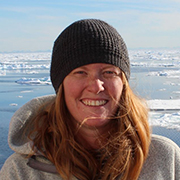A .gov website belongs to an official government organization in the United States.
A lock () or https:// means you've safely connected to the .gov website. Share sensitive information only on official, secure websites.

Ammonia (NH3) is an important precursor of particulate formation in atmosphere, and can impact air quality, climate and biodiversity. I will discuss field measurements made by my research group over the last five years that we are using the understand the impact of ammonia on atmospheric composition across a range of environments. In the Arctic atmosphere during summer, we identified an important role for migratory seabird colonies as a source of ammonia. Due to the relatively pristine atmosphere, this ammonia was found in model simulations to exert a large influence on the number of cloud condensation nuclei, and ultimately on the regional climate forcing. Agricultural activities, including animal husbandry and fertilizer application, are the most important sources of ammonia on a global scale. Our aircraft and ground-based measurements in the Utah Winter Fine Particle Study in 2017 indicate that ammonia plays an important role in regulating mass loading of fine particles during air quality exceedance events. We find that current emission inventories are biased low, especially in regions where animal husbandry is the dominant source. Our eddy covariance flux measurements of ammonia above fertilized corn fields in the 2017 and 2018 growing seasons suggest that management practices and environmental conditions can control the magnitude, and even direction, of ecosystem-atmosphere ammonia flux. I will also share some recent model simulations performed to assess the impact of ammonia oxidation by OH on global NOx and N2O budgets.
Dr. Jennifer Murphy is a professor in the Department of Chemistry at the University of Toronto. She received her BSc from McGill University and her PhD in Physical Chemistry from the University of California Berkeley. She did postdoctoral research at the University of East Anglia before joining the faculty of the University of Toronto in 2007. She earned the 2019 AGU Ascent Award in Atmospheric Sciences, and currently serves on the IGAC Scientific Steering Committee. Her research focuses on the chemical transformation of trace gases in the atmosphere, with applications to biosphere-atmosphere interactions.
ALL Seminar attendees agree not to cite, quote, copy, or distribute material presented without the explicit written consent of the seminar presenter. Any opinions expressed in this seminar are those of the speaker alone and do not necessarily reflect the opinions of NOAA or CSL.